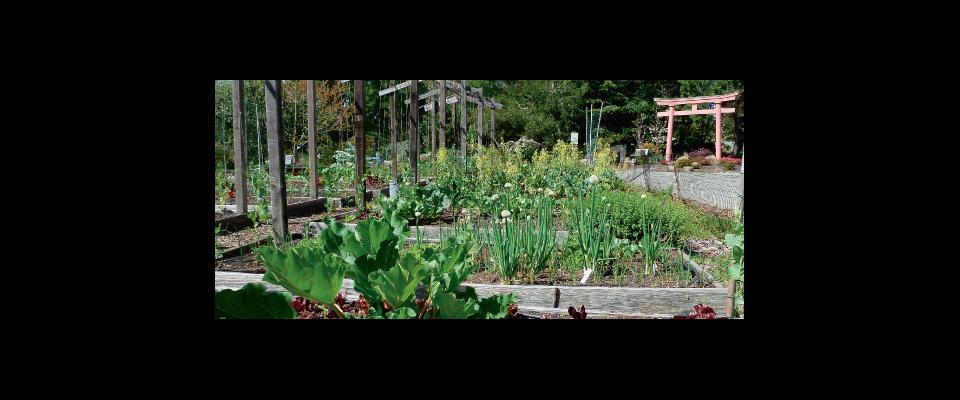Berkeley alumni envision a new food system for Oakland.
This spring, iconic urban homesteader and Farm City author Novella Carpenter ’07 made headlines when Oakland officials singled her out for failing to comply with urban agriculture laws. Her crime? Selling homegrown produce without a business license and growing vegetables on an empty lot without a permit.
Given that Carpenter had for a few years already been chronicling her adventures in the ghetto raising a menagerie of livestock on squatted land, a public outcry ensued. Fellow residents, newspaper columnists, and fans of her popular memoir and blog Ghost Town Farm all rallied to her support.
Also coming to the guerilla gardener’s defense was a relative newcomer to the food advocacy scene, the Oakland Food Policy Council (OFPC). Started last year, this nonprofit quickly put together a petition statement in support of revising arcane city codes to let urban agriculture (crops and livestock) legally expand in Oakland—home to a thriving group of urban farmers, some of whom currently operate outside the margins of the law. Carpenter eventually raised the $2,500 she needed for a conditional use permit, but she and the council want the codes to change so that other urban farmers won’t have to go through the bureaucratic hassle—and cost—she endured.
“Novella’s situation was a catalyst and a great way to raise awareness and education around the urban agriculture issue,” says OFPC councilmember Nathan McClintock ’11. McClintock is a doctoral candidate writing his thesis on urban ag who has inventoried vacant and underutilized public land in Oakland, with an eye towards turning it into city farms. Now the OFPC hopes that this combination of public interest and community outreach will fuel a transformation of Oakland’s food system, making fresh, affordable produce accessible to all.
The council was conceived as a result of research on Oakland’s food systems conducted in 2005 by Berkeley students Serena Unger ’06 and Heather Wooten ’06 at the behest of then-mayor Jerry Brown. Following their report, in 2006 the city provided seed funding for the OFPC. Among its goals, the council aims to address significant social disparities in this city of nearly 400,000: Affluent neighborhoods such as Rockridge have one full-service grocery store for every 4,333 people. By comparison, West Oakland, with more than 30,000 residents, is bounded by three freeways, is blighted by high unemployment, crime, and diet-related disease, yet boasts not a single such store.
The 21 members of the council, whose work is supported by city, county, and foundation funding, imagine an Oakland where fresh food is available within walking distance of all its residents, where swaths of green space are cultivated for edible production, and where small, local food entrepreneurs flourish along with full-service grocery outlets. The council’s one paid employee was, until recently, Alethea Harper, M.A. ’07, who while at Berkeley worked on a project with the food justice and educational nonprofit People’s Grocery. During Harper’s tenure, the council published a ten-point plan to expand accessible and affordable farmers’ markets, encourage healthy mobile food vending (think street trucks and carts selling fresh fruits and other nutritious fare), and develop a fresh food financing initiative that would provide economic and other assistance to new food enterprises in overlooked areas. The group also seeks to educate residents on city food policy matters.
Behind the scenes, the OFPC has been methodically working on policy recommendations to overhaul the city’s urban agriculture codes, which, until April this year, had not been updated since 1965. Oakland is moving in the direction of making such changes, says Eric Angstadt, the city’s planning director. But since Oakland’s proposed code revisions would go beyond that of cities like San Francisco to include conditions for raising farm animals without a permit, it may take some time. Nobody gets steamed up when residents peddle chard to their neighbors; but raising livestock is likely to be a more contentious matter, with noise, smells, and animal rights issues in the mix. To date, the OFPC’s petition statement has garnered hundreds of signatures, and the mayor’s office has been inundated with supporters of urban agriculture changes, in part due to OFPC efforts.
Stakeholders on the food policy council include anti-hunger and food justice advocates, educators, nonprofit staffers, government officials, workers, farmers, grocers, chefs, and food distributors. Such coalitions began popping up across North America in the 1980s as a response to years of government neglect of the nutritional needs of low-income communities, note Robert Gottlieb and Anupama Joshi in their recent book Food Justice.
“The OFPC has done a tremendous job bringing folks together that have never talked before but are working on the same thing,” says councilmember Jennifer LeBarre, the nutrition services director for the Oakland Unified School District. And while it’s true that a plethora of nonprofits are working on food security issues in this city—including People’s Grocery, City Slicker Farms, Mandela Foods Cooperative, Phat Beets, and Oakland Food Connection—few, if any, of these groups have the time or resources to spend pursuing policy initiatives that could bring about systemwide change.
“Policy change affects everyone,” says Wooten, who now sits on the council, “so it’s important that we come together around shared interests and make sure all stakeholders have a chance to share their perspectives.”
No less an authority on food security than Berkeley visiting scholar Raj Patel, author of Stuffed & Starved, sings the group’s praises on the speaking circuit, but not everyone’s a fan of the council.
“I went to a few meetings; they went on for hours. I want to just get out there and do it, make change from working the soil,” says Abeni Massey (formerly Ramsey). Massey, an Oakland resident, is herself a success story of urban gardening. She turned to farming as a way to provide economical yet healthy food for her family. She started working as a market coordinator for City Slicker Farms, and eventually started City Girl Farms. “It’s a revolutionary act to plant a tomato in your backyard,” adds Massey, who was recently featured in the TV series Food Forward. She thinks OFPC could have done more to champion Carpenter’s cause by making a stand on her case rather than addressing urban agriculture reform in general.
Alethea Harper, who left the council in June, understands the frustration with the pace of policy work. She will train her replacement and follow the council under its new leadership. “Policy work takes time, and a city bureaucracy moves slowly; you have to have patience,” she says. “But I’m confident many of the OFPC’s great ideas will happen.”

















